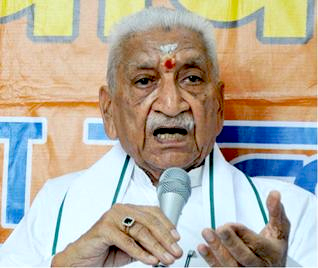New Delhi, Dec 24: The Delhi Police said that a head constable was killed during clashes over the Citizenship Amendment Act (CAA) in northeast Delhi today.
Deputy Commissioner of Police, Shahdara, Amit Sharma was also injured during clashes, a senior official said. Sharma suffered injuries to his head and hand. He was hospitalised and is doing fine, the official added.
Tension escalated in northeast Delhi with protesters torching at least two houses and a fire tender in the Jaffrabad and Maujpur areas, where pro and anti-CAA groups clashed for the second consecutive day on Monday and hurled stones at each other.
Violence was also reported from the Chandbagh area in Jaffrabad.
Police fired tear gas shells and also resorted to lathicharge to disperse the protesters.
According to officials, a fire tender was damaged by the protesters after it responded to a fire call in the area.
The Delhi Metro closed entry and exit at the Jaffrabad and Maujpur-Babarpur stations as an uneasy calm prevailed in the area.
"Entry & exit of Jaffrabad and Maujpur-Babarpur are closed. Trains will not be halting at these stations," the Delhi Metro Rail Corporation (DMRC) said in a tweet.
Entry and exit were closed at the Jaffrabad metro station for over 24 hours.
Clashes broke out on Sunday evening between pro and anti-CAA groups near Jaffrabad after a large number of people protesting against the Citizenship (Amendment) Act (CAA) blocked a road, while similar sit-ins were launched in several other parts of the national capital.
Delhi chief minister Arvind Kejriwal has urged lieutenant governor of Delhi and the Union home minister to restore order.
Nobody should be allowed to orchestrate violence, he said.
Delhi Lt Governor Anil Baijal instructed the police commissioner to maintain law and order in the national capital in the wake of violence.
"Instructed @DelhiPolice and @CPDelhi to ensure that law and order is maintained in North East Delhi. The situation is being closely monitored. I urge everyone to exercise restraint for maintenance of peace and harmony," Baijal tweeted.
Delhi minister and Babarpur MLA Gopal Rai on Monday urged the people in the area to maintain peace, saying some people were purposely trying to disturb the atmosphere.
"With folded hands, I request people in Babarpur Assembly to maintain peace. Some people are purposely trying to spoil the atmosphere. I have spoken to Delhi LG and he has assured me that more policemen will be deployed to bring the situation under control," Rai said in a tweet.







Comments
Add new comment